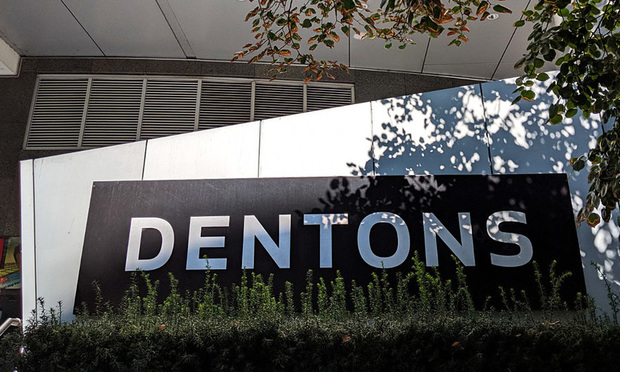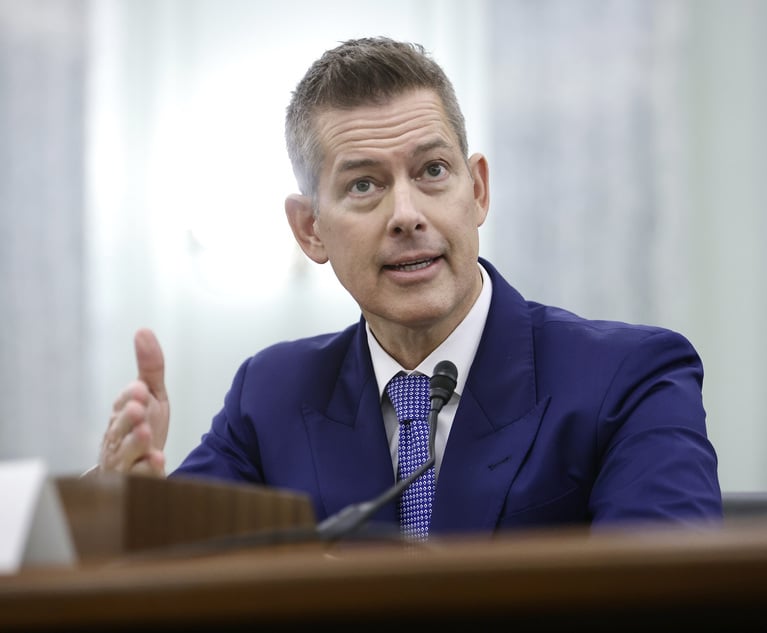US Justice Dept. Asks Appeals Court to Scrap Dentons' $7M Fee Award
The government told the U.S. Court of Appeals for the Federal Circuit it would not further question or contest novel issues tied to Dentons' third-party litigation finance arrangement.
December 04, 2019 at 06:49 PM
4 minute read
 Dentons offices in Vancouver, British Columbia, Canada. Photo: Mike Scarcella/ALM
Dentons offices in Vancouver, British Columbia, Canada. Photo: Mike Scarcella/ALM
The U.S. Justice Department on Wednesday asked a federal appeals court in Washington to void a $7.4 million legal-fee award secured by the global law firm Dentons, arguing that the government's litigation stance in the patent case was "substantially" justified and that the plaintiff should not be given any compensation at all.
A Dentons team won the fees in the U.S. Federal Claims Court for work on behalf of FastShip Inc., described in court papers by the government as "a Philadelphia-based start-up that attempted to raise money for a high-speed, transatlantic cargo ship service." The company, which had alleged U.S. combat ships infringed certain patent rights, declared bankruptcy in 2012.
The Justice Department is appealing the Federal Claims award, and the government's opening brief, filed Wednesday in the U.S. Court of Appeals for the Federal Circuit, asserted the lower court misapplied various federal provisions that allow successful plaintiffs to recoup fees and costs.
The government, however, said it does not intend to raise further questions about the litigation-funding arrangement in which Dentons received an initial payment of $600,000 from a Virginia-based entity called IPCo LLC.
In the lower court, the government had contested whether the litigation funding deal meant FastShip was not actually a "real party in interest" entitled to any fees. "The agreements were structured so that FastShip never paid any litigation expenses, other than the promised contingent fees to IPCo and Dentons from any award," the Justice Department said in Wednesday's court filing.
"While the government does not agree with the [lower court's] conclusions with respect to the real-party-in-interest issue and many of FastShip's specific requests for expenses, the government is only contesting the substantial justification issues for purposes of this appeal," Justice Department lawyer Scott Bolden, deputy director of the agency's commercial litigation branch, said in court papers.
FastShip's third-party funding arrangement, increasingly common in litigation across the country, had generated substantial discussion in the Federal Claims court. Judges ever more are facing questions about the propriety of outside financing arrangements and how much information about these deals should be revealed to parties and the courts.
Judge Charles Lettow of the U.S. Court of Federal Claims, presiding in FastShip's case, described litigation funding as a "controversial" and evolving part of the law. He noted the Federal Claims court has not adopted any rules addressing litigation financing agreements.
"Litigation financing agreements help bridge this divide by providing the attorney of record a source of guaranteed fees for their work, while granting the financer a share of the proceeds if the case is successful," Lettow wrote in his ruling in June. "Here, IPCo. acted as that bridge, covering the gap between claim and litigation, allowing FastShip to successfully pursue their infringement case. Preventing recovery based on such an agreement would be anathema to the underlying purpose of fee-shifting statutes."
The thrust of Lettow's ruling focused on whether the government's position in the litigation was "substantially justified." The Justice Department on Wednesday argued among other things that Lettow went too far in assessing pre-litigation conduct in his award of legal fees.
"The government's noninfringement position was supported by the intrinsic record and FastShip's own documents," Bolden wrote in DOJ's court filing.
Read more:
Allegations Against Burford Could Muddy Waters for Litigation Funding
Dentons Wins $7.4M in Fees, Costs Despite Litigation-Finance Agreement
Arbiters Push for More Disclosure as Litigation Funding Expands Into Their Venue
Litigation Funders Tap D.C. Firms for Lobbying Efforts Amid Finance Reform Dispute
As Capital Pours In, a Litigation Funding Icon Changes Its Strategy
This content has been archived. It is available through our partners, LexisNexis® and Bloomberg Law.
To view this content, please continue to their sites.
Not a Lexis Subscriber?
Subscribe Now
Not a Bloomberg Law Subscriber?
Subscribe Now
NOT FOR REPRINT
© 2025 ALM Global, LLC, All Rights Reserved. Request academic re-use from www.copyright.com. All other uses, submit a request to [email protected]. For more information visit Asset & Logo Licensing.
You Might Like
View All
Apple Files Appeal to DC Circuit Aiming to Intervene in Google Search Monopoly Case
3 minute read

DOT Moves to Roll Back Emissions Rules, Eliminate DEI Programs

Law Firms Mentioned
Trending Stories
- 1The Law Firm Disrupted: Scrutinizing the Elephant More Than the Mouse
- 2Inherent Diminished Value Damages Unavailable to 3rd-Party Claimants, Court Says
- 3Pa. Defense Firm Sued by Client Over Ex-Eagles Player's $43.5M Med Mal Win
- 4Losses Mount at Morris Manning, but Departing Ex-Chair Stays Bullish About His Old Firm's Future
- 5Zoom Faces Intellectual Property Suit Over AI-Based Augmented Video Conferencing
Who Got The Work
J. Brugh Lower of Gibbons has entered an appearance for industrial equipment supplier Devco Corporation in a pending trademark infringement lawsuit. The suit, accusing the defendant of selling knock-off Graco products, was filed Dec. 18 in New Jersey District Court by Rivkin Radler on behalf of Graco Inc. and Graco Minnesota. The case, assigned to U.S. District Judge Zahid N. Quraishi, is 3:24-cv-11294, Graco Inc. et al v. Devco Corporation.
Who Got The Work
Rebecca Maller-Stein and Kent A. Yalowitz of Arnold & Porter Kaye Scholer have entered their appearances for Hanaco Venture Capital and its executives, Lior Prosor and David Frankel, in a pending securities lawsuit. The action, filed on Dec. 24 in New York Southern District Court by Zell, Aron & Co. on behalf of Goldeneye Advisors, accuses the defendants of negligently and fraudulently managing the plaintiff's $1 million investment. The case, assigned to U.S. District Judge Vernon S. Broderick, is 1:24-cv-09918, Goldeneye Advisors, LLC v. Hanaco Venture Capital, Ltd. et al.
Who Got The Work
Attorneys from A&O Shearman has stepped in as defense counsel for Toronto-Dominion Bank and other defendants in a pending securities class action. The suit, filed Dec. 11 in New York Southern District Court by Bleichmar Fonti & Auld, accuses the defendants of concealing the bank's 'pervasive' deficiencies in regards to its compliance with the Bank Secrecy Act and the quality of its anti-money laundering controls. The case, assigned to U.S. District Judge Arun Subramanian, is 1:24-cv-09445, Gonzalez v. The Toronto-Dominion Bank et al.
Who Got The Work
Crown Castle International, a Pennsylvania company providing shared communications infrastructure, has turned to Luke D. Wolf of Gordon Rees Scully Mansukhani to fend off a pending breach-of-contract lawsuit. The court action, filed Nov. 25 in Michigan Eastern District Court by Hooper Hathaway PC on behalf of The Town Residences LLC, accuses Crown Castle of failing to transfer approximately $30,000 in utility payments from T-Mobile in breach of a roof-top lease and assignment agreement. The case, assigned to U.S. District Judge Susan K. Declercq, is 2:24-cv-13131, The Town Residences LLC v. T-Mobile US, Inc. et al.
Who Got The Work
Wilfred P. Coronato and Daniel M. Schwartz of McCarter & English have stepped in as defense counsel to Electrolux Home Products Inc. in a pending product liability lawsuit. The court action, filed Nov. 26 in New York Eastern District Court by Poulos Lopiccolo PC and Nagel Rice LLP on behalf of David Stern, alleges that the defendant's refrigerators’ drawers and shelving repeatedly break and fall apart within months after purchase. The case, assigned to U.S. District Judge Joan M. Azrack, is 2:24-cv-08204, Stern v. Electrolux Home Products, Inc.
Featured Firms
Law Offices of Gary Martin Hays & Associates, P.C.
(470) 294-1674
Law Offices of Mark E. Salomone
(857) 444-6468
Smith & Hassler
(713) 739-1250








